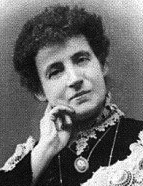

The spirit that was present in so many works also left its mark on the cultural societies of Carolina’s day. In 1877, she was made an honorary member of the Berlin Institute of Living Languages. The University of Freiburg was the first to award her the title of doctor honoris causa. This example was followed by the University of Coimbra, in Romance and Germanic Philology, and then, in 1923, by the University of Hamburg. Despite Carolina’s great dedication to Queen Amélia, which was reciprocated with a feeling of great admiration, it was only in 1901 that the Portuguese monarchy awarded her the Ordem de São Tiago (Order of St. James). She was above all honoured by intellectual republicans, who were responsible for her appointment to the chair of Germanic Philology on the Humanities Course (CSL), followed by her acclamation at the University of Coimbra in her first year as a member of the teaching staff (Maria Manuela Delille, Carolina Michaëlis de Vasconcelos…, 1985). It is strangely ironic that, having come from the “metropolis of intelligence” (Lições… 1956, p.6), Carolina Michaëlis de Vasconcelos ended up being distinguished for her intelligence, erudition and body of work in a country in which, for women, “knowledge is seen as a useless and dangerous thing” (Movimento…, 2002, p.32).
In 1911, the Lisbon Academy of Sciences (ACL) honoured her with membership, albeit only after a formal battle about the fact she was a woman. An issue of Boletim de Segunda Classe (literally, Second-Class Bulletin) appeared with various testimonies to her qualities from friends of both sexes and her peers. She agreed to be Honorary President of the National Council of Portuguese Women (CNMP), which was founded in 1914, despite practically not having taken part in its more active work, which was centred in Lisbon. Her death was followed by a series of public homages, the first of which was paid by the CNMP (1926). The University of Coimbra then organised a major event (1930-1933), which brought together a large number of people who had worked with Carolina and who came to pay homage to someone who was considered the “wisest woman of her time”, in the words of her Camonian master W. Storck. Other forms of homage followed: the baptism of a Porto high school (now Carolina Michaëlis Secondary School) with the name of the city’s eminent resident, the publication of facsimile editions from the 1980s onwards, the naming of streets all over the country, and recently the choice of a Porto Metro station to bear her name.
